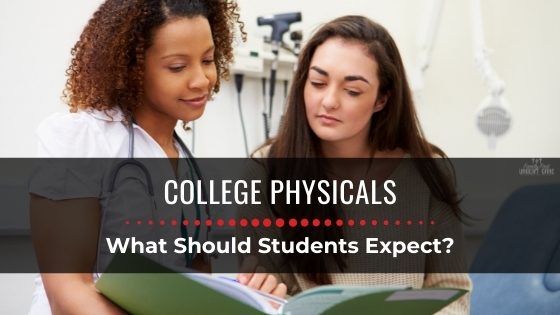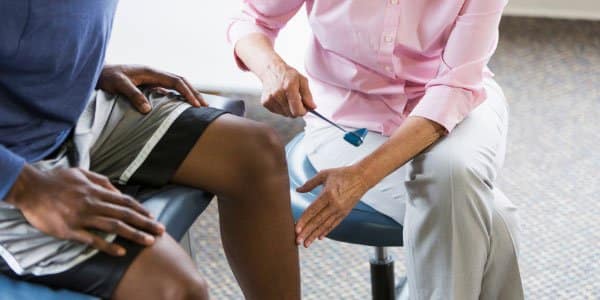
Getting a physical before the school year begins has become routine for elementary, middle and high school students, but many may not be aware of the rules for college physicals.
Each college and university can have different requirements for students having physicals before attending classes. The best way to verify exactly what is required in terms of a college physical is to visit the university’s website or contact the admissions office.
Regardless of what is required by each college or university, most healthcare professionals encourage students to get college physicals so they will have a baseline for their well being as they move forward into independence.
Making An Appointment for a College Physical
Whether a student is considering a no-appointment required walk in at a local urgent care center or making an appointment for a college physical, there can be a few things to keep in mind:
- Age: One thing that can be different about a college physical is that most students receiving it are eighteen years or older, meaning they are technically allowed to make their own appointment and begin taking care of their own health. That said, it may take a friendly reminder from a parent or caregiver to get the physical taken care of.
- Timing: There is frequently a back-to-school rush when it comes to students needing physicals for sports and extracurricular activities. For this reason, some medical providers may become overwhelmed with requests for physicals which can make it hard to get in.
- Location: College physicals can be done at a variety of different medical offices. However, many college students find a walk in physical at an urgent care center much more convenient than trying to work their schedule around an appointment somewhere else.
- Immunization History: Students should have an updated copy of their immunization history in hand and bring it with them to their college physical. This gives medical professionals a more complete picture of a student’s immunization history and may dictate which vaccines, if any, are needed going forward.

Immunizations Are a Key Component of College Physicals
Most colleges and universities abide by their state’s immunization recommendations for college aged students; however, it is worth noting that does not mean those standards necessarily meet those recommended by the Centers for Disease Control (CDC).
In Texas, the minimum vaccine requirements for college entry set forth by the state include students being able to show proof of at least an initial meningococcal vaccination or booster dose for the previous five years, although there are some limited exceptions to this rule. Students who are required to get this vaccine and have not yet done so, must get the immunization a minimum of ten days before the semester officially begins.
It is also recommended to check with the higher-level learning institution you will be attending to see if they are mandating that students show proof of receiving a COVID-19 vaccine. This varies from college to college and could be subject to change. Check with your university about any coronavirus vaccine requirements they may have at least two weeks before arriving on campus.
In addition to the above vaccines, it is recommended to speak with a healthcare professional about the possibility of needing other vaccines commonly given before leaving for college, such as:
- Flu
- HPV (Human Papillomavirus Vaccine)
- MMR (Measles, Mumps, and Rubella)
- TDaP (Tetanus, Diphtheria, and Pertussis)

What to Expect During a College Physical
In addition to making sure a student is current on their vaccinations, a college physical is also an opportunity to create a baseline for a student’s adult health record. Some of the elements of college physicals can include:
- Health History Review: Patients should tell a doctor about any past health concerns or significant health events. This part of the exam also includes sharing lifestyle behaviors like diet and exercise routines as well as participation in drinking, smoking, and sex.
- Vitals Check: Expect the physician to do a check of vital signs such as temperature, heart rate, blood pressure, and respiration rate. Each of these can help provide a medical professional with a more complete profile of a patient’s current health status.
- Stethoscope Exams of Heart and Lungs: The doctor will typically use a stethoscope to listen to the heart and lungs for issues such as a heart murmur, abnormal heartbeat, or wheezing—any of which may point to conditions that require a diagnosis.
- Ear, Nose, and Throat Check: A physician will check a patient’s ears for wax and infections as well as check the nose and throat for inflammation, sinus issues, and overall oral health.
- Physical Exam: This can run the gamut from a check for skin cancer to an abdominal exam to various tests to inspect muscle strength and reflexes.
- Blood Work: It is not uncommon for a physician to order bloodwork to check a patient’s red and white blood cell counts, cholesterol levels, and more.


If you have not yet scheduled your college physical and are leaving for university soon, visit your local urgent care center today so you are ready to start the school year on the right foot.
- The Dangers of Heat Stroke - August 2, 2022
- Health Devices and Supplies For Home - July 19, 2022
- Hydration for Houston’s Summer Heat - July 1, 2022



